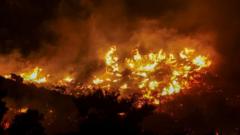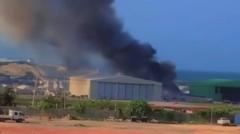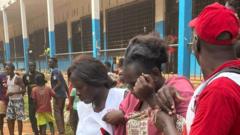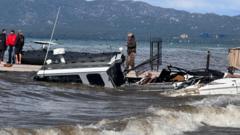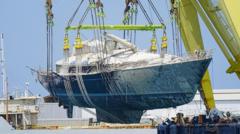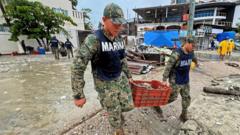As wild weather continues to batter Queensland and New South Wales, authorities report a body found in floodwaters and several Australian Defence Force members injured in a vehicle incident.
**Tragic Outcomes Amid Severe Storms in Australia: Body Found and Troops Injured**

**Tragic Outcomes Amid Severe Storms in Australia: Body Found and Troops Injured**
Severe weather from Cyclone Alfred wreaks havoc on eastern Australian coast, leading to fatalities and injuries.
Authorities in Australia are grappling with the aftermath of Cyclone Alfred, which transitioned from a tropical cyclone to a tropical low as it made landfall near Brisbane. Amidst powerful winds and heavy rains that have tossed debris across the region, officials confirm that one individual's body has been recovered from floodwaters in Dorrigo, Northern New South Wales. The deceased is believed to be a 61-year-old man who had been reported missing after his vehicle was engulfed by rising water.
In a separate incident, a collision involving military vehicles near Lismore resulted in injuries to 13 Australian Defence Force personnel. According to Federal Defence Personnel Minister Matt Keogh, the soldiers were aiding in rescue operations when their convoy was involved in an accident on a narrow road. The military’s efforts are crucial as they work to support local communities affected by the storm, which has already left over 300,000 properties without power.
Prime Minister Anthony Albanese underscored the serious nature of the situation, emphasizing the necessity for vigilance among residents. Despite the cyclone being downgraded, weather warnings remain active as flooding and potential further hazards are anticipated over the coming days.
The storm's effects have led to school closures and the suspension of public transportation throughout Queensland and Northern New South Wales, impacting millions of residents. Emergency services are stretched thin, managing widespread flooding and responding to storm-related incidents. In Brisbane, many rushed to safety as the cyclone approached, while shelters prepared to accommodate vulnerable populations.
In impacted areas along the Gold Coast, conditions have been described as intense, with strong winds uprooting trees and causing damage to properties. Authorities continue to advise residents to remain indoors as clean-up operations will be delayed until the situation stabilizes.
As assessments of the damage begin, the importance of preparedness and collective community support become paramount for those grappling with the aftermath of these severe weather events.
In a separate incident, a collision involving military vehicles near Lismore resulted in injuries to 13 Australian Defence Force personnel. According to Federal Defence Personnel Minister Matt Keogh, the soldiers were aiding in rescue operations when their convoy was involved in an accident on a narrow road. The military’s efforts are crucial as they work to support local communities affected by the storm, which has already left over 300,000 properties without power.
Prime Minister Anthony Albanese underscored the serious nature of the situation, emphasizing the necessity for vigilance among residents. Despite the cyclone being downgraded, weather warnings remain active as flooding and potential further hazards are anticipated over the coming days.
The storm's effects have led to school closures and the suspension of public transportation throughout Queensland and Northern New South Wales, impacting millions of residents. Emergency services are stretched thin, managing widespread flooding and responding to storm-related incidents. In Brisbane, many rushed to safety as the cyclone approached, while shelters prepared to accommodate vulnerable populations.
In impacted areas along the Gold Coast, conditions have been described as intense, with strong winds uprooting trees and causing damage to properties. Authorities continue to advise residents to remain indoors as clean-up operations will be delayed until the situation stabilizes.
As assessments of the damage begin, the importance of preparedness and collective community support become paramount for those grappling with the aftermath of these severe weather events.

